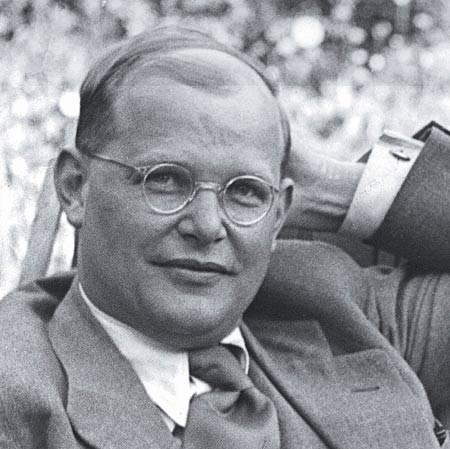The more one comes to know and understand Dietrich Bonhoeffer, the harder it becomes to deny a certain prophetic gift he had for understanding the problems in the church for years to come. He was writing and pastoring in the dawning age of modern theological liberalism, and this is evident in his critiques of the church of his day. What were only budding theological errors and problems in his day have now taken full bloom. Indeed, one wonders that if he was able to write “There is no theology here” about the teachings of Union Theological Seminary in 1929, what would he say about much of the Western Evangelical Church today?
These same kinds of questions appear in our minds when we approach Bonhoeffer’s classic The Cost of Discipleship. If the issue of cheap grace was apparent in his day, what would he think about our shallow proclamations of the gospel today? What would he make of the lordship salvation issue that was prominent in the late 80’s and early 90’s, that still invades many evangelical churches today, teaching that we can be a Christian but not a disciple? What would he make of the law-grace debates that blow up the Christian blogosphere every 6 months? Well, when we turn to the opening chapter of Discipleship, we have our answer. He’d lament the malignant state of the church.
Bonhoeffer understood the deep, necessary relationship between justification and sanctification in the Christian life. When these two aspects of our union with Christ are separated, we are left with cheap grace – “bargain-basement goods, cut-rate forgiveness, cut-rate comfort, cut-rate sacrament.” Cheap grace is left only as a system to take advantage of, where justification now no longer means the justification of the sinner, but of sin itself. Thus nothing about our sinful lives needs to change. If we change our lives to conform to the commandments of Jesus Christ, then we no longer trust in cheap grace, and that becomes too uncomfortable. So long as we conform to the world, we can still accept cheap grace and assure ourselves that our sins are forgiven. Within the bounds of a system of cheap grace, there is now forgiveness without repentance, baptism without discipline, and the Lord’s Supper without confession of sin.
Yet this is strikingly different than the kind of grace we should be accustomed to! The grace lived out in the Christian life is not a cheap grace, but a costly grace. “It is costly, because it calls to discipleship; it is grace, because it calls us to follow Jesus Christ. It is costly, because it costs people their lives; it is grace, because it thereby makes them live…Above all, grace is costly, because it was costly to God, because it costs God the life of God’s Son – and because nothing can be cheap to us which is costly to God.” If grace was costly for God, it is costly to us, which means we must strive for obedience to Christ’s commandments.
Martin Luther understood the problem with cheap grace, and Bonhoeffer explains his system of thought well. Luther understood that grace is the “result given by Christ himself to Christian life,” which means our life is not excused from discipleship in any way. Too many people instead take grace as a presupposition, therefore excusing any sin that they commit. Luther knew that we “sin boldly,” yet should believe and rejoice in Christ even more boldly. There is no escaping being a sinner in this life, yet we believe and rejoice in Christ and strive for obedience to him all the same.
Dietrich certainly knew of the problems facing the rising liberalism in churches of his day. We would be wise to meditate on his words and corrections for the church. He saw the cusp of the dam that has overflowed today, “Is the price that we are paying today with the collapse of the organized churches anything else but an inevitable consequence of grace acquired too cheaply? We gave away preaching and sacraments cheaply; we performed baptisms and confirmations; we absolved an entire people, unquestioned and unconditionally; out of human love we handed over what was holy to the scornful and unbelievers. We poured out rivers of race without end, but the call to rigorously follow Christ was seldom heard.”
If we surveyed the Evangelical landscape today, could this not be a summary of the problems we are facing today? Shallow churches that preach a shallow gospel, with little commitment other than an occasional stop at the church to be assured that our sins are still forgiven? Perhaps if we recognized that “the word of cheap grace has ruined more Christians than any commandment about works,” we would do a better job at stopping this train in its tracks. If we realized that living under grace means striving to live in the world without losing ourselves to it; if we realized that living under grace means giving up our lives for the one who laid down his life for us, we would have a better understanding of grace. Not a cheap grace, but a costly grace. As Bonhoeffer says, “Blessed are they for whom following Jesus Christ means nothing other than living from grace and for whom grace means following Christ.”
From Dietrich Bonhoeffer in Tegel prison, to his fiance Maria von Wedemeyer.
—–
12 August 1943
My Dearest Maria,
After sending off my last letter to you, I was suddenly afraid that my Tegel address on the envelope might make trouble for you in the village. Although I can almost hear you laugh out loud at the idea – and I look forward to hearing you laugh – I don’t think such matters should be treated lightly. It really isn’t necessary for you to be subjected to village gossip about your fiance. And so, to preclude any such possibility, I didn’t write to you again but asked my parents how you felt about it. Today, however, your dear letter arrived, and I simply can’t remain silent. But please, next time tell me how I’m to write to you in the future. I won’t write again until I hear.
So now to your letter. You can’t possibly imagine what it means to me, in my present predicament, to have you. I’m under God’s special guidance here, I feel sure. To me, the way in which we found each other such a short time before my arrest seems a definite indication of that. Once again, things went “hominum confusione et dei providentia (according to man’s confusion and God’s providence).” It amazes me anew every day how little I have deserved such happiness, just as it daily and deeply moves me that God should have put you through such an ordeal this past year, and that he so clearly meant me to bring you grief and sorrow, so soon after we got to know each other, to endow our love with the proper foundation and the proper strength. Moreover, when I consider the state of the world, the total obscurity enshrouding our personal destiny, and my present imprisonment, our union – if it wasn’t frivolity, which it certainly wasn’t – can only be a token of God’s grace and goodness, which summon us to believe in him. We would have to be blind not to see that. When Jeremiah said, in his people’s hour of direst need, that “houses and fields [and vineyards] shall again be bought in this land,” it was a token of confidence in the future. That requires faith, and may God grant it to us daily. I don’t mean the faith that flees the world, but the faith that endures in the world and loves and remains true to that world in spite of all the hardships it brings us. Our marriage must be a “yes” to God’s earth. It must strengthen our resolve to do and accomplish something on earth. I fear that Christians who venture to stand on earth on only one leg will stand in heaven on only one leg too.
I’m thoroughly in favor of your pastor marrying us, but the way. In these matters I think would should always to the most obvious thing. That’s more important than any personal preference.
So now you’ve got the house full of people. How much I would have liked to see you running the household at this time! Your mother wrote me such a nice letter again, telling me all kinds of things. Please thank her very much indeed; I know what a sacrifice if must be for her to find the time to write to me. But there’s no greater pleasure in this place than getting letters from people. One rereads them innumerable times so as to share in their lives.
It’s a cloudy, rainy day outside, a perfect accompaniment to my fruitless wait for the situation to resolve itself. But let us never forget how much we have to be thankful for, and how much good we experience even so; I have only to think of you, and all the little shadows on my soul disperse. So let us continue to be really patient for the rest of the time we’re compelled to wait, and not waste a single hour grousing and grumbling. From God’s standpoint, this time of waiting is immensely valuable; much depends on how we endure it and on whether we need not feel ashamed, later on, of having failed to recognize these months of testing as a gift from God. I’m convinced that our love and our marriage will derive eternal strength from this time of trial. So let us wait, with and for each other, until our wedding day dawns. It won’t be much longer, my dear, dear Maria!
Please give my love to your mother and your brothers and sisters. Is it Lutgert who was killed in action? You must all be very sad. Please remember me to his wife. Good-bye, dearest Maria, and may God preserve us and our families.
Your Dietrich, who looks forward from one letter to the next, embraces you!
I’ve previously written on a book about Dietrich Bonhoeffer, a book that I was very delighted to read and recommend to readers of this blog.
Bonhoeffer is a figure from contemporary church history that I do not think it is possible to read “too much” of. He is delightfully quotable and thoroughly convicting; a man with much to say about the Christian life in reality of this side of the cross.
There are many books one could select from to encounter Bonhoeffer. Many people today discover Bonhoeffer through the popular biography by Eric Metaxas; others discover him after hearing Life Together or The Cost of Discipleship quoted by their pastor. If you want an introduction to Bonhoeffer as a preacher, you could read Isabel Best’s The Collected Sermons of Dietrich Bonhoeffer. Beyond those foundational texts, it is hard for the student or lay person to find another resource to continue their experience with Dietrich Bonhoeffer.
popular biography by Eric Metaxas; others discover him after hearing Life Together or The Cost of Discipleship quoted by their pastor. If you want an introduction to Bonhoeffer as a preacher, you could read Isabel Best’s The Collected Sermons of Dietrich Bonhoeffer. Beyond those foundational texts, it is hard for the student or lay person to find another resource to continue their experience with Dietrich Bonhoeffer.
This is why I was incredibly thrilled at the release of The Bonhoeffer Reader, edited by Clifford Green and Michael Dejonge and published by Fortress Press. Based on the recent and massive publication of the Dietrich Bonhoeffer Works English Edition (DBWE), The Bonhoeffer Reader is meant to serve the general reader or beginning student. This book provides a series of excerpts from Bonhoeffers life, from those written as a young student to texts published shortly after his death. These readings also cover a wide variety of genres, from academic texts to lecture notes and other short pieces. It is for this reason that The Bonhoeffer Reader is considered primarily a theological reader; it gives us depth and insight into the theological mind of Bonhoeffer not formerly available to a wide audience.
There are many features about this book that make it a great resource for lay-readers and students alike. First, the breadth of wisdom over a large variety of topics has been included for all readers. Bonhoeffers writings on Ethics, Ecumenism, the German Church, Christian life, and his University writings/lectures are all included. Secondly, the footnotes for this text have been largely stripped down in comparison to its DBWE counterpart, making them more readable for a wide audience. One of the greatest features of this text is that in its margins, the page numbers corresponding to the DBWE are included. This is a great feature to include for students who may read an excerpt in The Bonhoeffer Reader and then desire to continue reading the entire piece in the DBWE at a local library. I am also thrilled at any text that includes an index of Scripture references, which is readily available in the back of this book (as well as an index of names).
Each work included by Bonhoeffer includes a brief introduction and background included by the editors. These inclusions provide moments of history in Bonhoeffers life that really make the writings “pop” to the reader. An example of the impacts in this attention to detail is seen in the short work entitled Protestantism Without Reformation. The history provided tells the reader that this work was written shortly after Bonhoeffers return from his second visit to the United States at a time when he was seriously considering the differences between the American and German churches. This would be some time before his arrest that led to his eventual martyrdom. In this work he writes:
Throughout the history of the church, endurance and flight in times of persecution have been the two Christian possibilities, since the days of the apostles. Endurance to the point of last resistance may be commanded; flight may be permitted or perhaps even commanded. The flight of a Christian in times of persecution is not apostasy and disgrace as such, for God does not call every person to martyrdom. Not flight but denial is sin, although there may be a situation where flight is the same as denial or, conversely, where flight itself may be a part of martyrdom (pg. 577).
When I first read this, I was in awe of Bonhoeffers prophetic words on his own life. Could it be possible that even at this time Bonhoeffer could sense God calling him to death for his church?
Bonhoeffer is a man who has much to say to us today, and is someone we would be wise to invest and listen to. It is for this reason I would heartily and readily encourage The Bonhoeffer Reader to any general reader, student or pastor seeking to move beyond the biographical or introductory texts previously available to them. This is a resource I would recommend being available to any individual curious in the theology and works of Dietrich Bonhoeffer.
So I’ve been reading through some of Dietrich Bonhoeffer’s sermon transcripts prior to his arrest and subsequent death. I stumbled upon this gem that I found to be very timely and relevant to events in the church today. The basic background of this sermon is it happened after the new Chancellor, Franz von Papen, took office in Germany. Papen hoped to form a society more in the German tradition, and a part of this tradition was invoking the name of God at the beginning of Parliament sessions. This is something the government used to do, but no longer did and was now going to be reinstated by Papen.
This sermon excerpt is taken from a sermon given on June 12, 1932 called “Risen with Christ.” It is on Colossians 3:1-4 :
If then you have been raised with Christ, seek the things that are above, where Christ is, seated at the right hand of God. Set your minds on things that are above, not on things that are on earth. For you have died, and your life is hidden with Christ in God. When Christ who is your life appears, then you also will appear with him in glory.
“Dear congregation, that is certainly an extremely off-putting way to start a conversation with a person: Since you have been raised with Christ, do this and that. We have been baptized. We have been confirmed. There were times when we felt like opening the Bible. We are interested in various religious questions. Maybe we even stand by our church with loyalty and love. And finally, after all: we live in a world that over the last one and a half to two thousand years under the name of Jesus Christ has developed as a Christian world. And nevertheless: if anyone tried to start a conversation with us by just speaking to us about the fact that we have been raised with Christ, we would probably prefer not to continue to speak with them.
…
One need only walk through the streets, look at the people, and ask yourself whether they accept this premise and live their lives on the basis of it, in order to see that what we call Christianity is, in human terms, hopelessly in need, that it is greatly impoverished, whether the churches are filled to overflowing as in America or almost empty as in much of Germany.
Our fathers still said, “In the name of God, Amen.” They still lived under the illusion that with that, they had said something that everyone had in common, that was an obligation to them all, that bound them all together. But they probably never allowed this “In the name of God, Amen” to become too dangerous, too disturbing, too revolutionary.
And why should they? This opening, this premise, could just as well mean everything as nothing. Having said these words, one could confidently draw the line and just go on, unworried and unswerving, and in the name of humankind make decisions and decrees and pass statutes, whatever one thought was good and whatever one liked. One went one’s way in complete freedom, with the name of God harmlessly backing one up and the earthly well-being of human beings in view.
…
Perhaps at first we are intoxicated by this grandiose prospect; we feel drunk in this gigantic freedom, without God and without hope, without a goal and without restraint, rushing violently ahead into chaos. Even the greatest futility can be intensified into pathos and art, into life and motivation. But as soon as we stop, sober up from our intoxication, come to our senses, it becomes unbelievably empty inside us: “Do you not taste the cup of nothingness, that dark drink?” And now what, what do we want now? Do we want to survive another crisis and then die, or what do we really want? We are told: “I have been through too much, I cannot be without religion anymore”; and that probably means: I have already looked too deeply into nothingness to be able to stand being in it any longer. So go back – but back to where? We read that a government issues a proclamation that a whole nation should be rescued from collapse – by the Christian worldview. So we are all fleeing, individuals and nations, fleeing from an incomprehensible last collapse. “In the name of God, Amen” is to be used again. Religion is to be cultivated again and a Christian worldview spread.
Oh how poor, oh, how weak, oh, how pitiful all of that sounds. Do we think that we would really let ourselves be taken captive a second time by this “In the name of God, Amen?” That we would let it really determine our actions, that we, you and I, rich and poor, German and French, would let ourselves be bound together by this name of God? Or is there not really, hidden behind our religious tendencies, our irrepressible craving for freedom and our own will – to in the name of God what we want, in the name of the Christian worldview to play off one nationality against another and stir them up to conflict with one another?
And only now does it fall like scales from our eyes; only now are we overcome by the certainty of the monstrous fact – that we are fleeing from God. Whether we dare to drink the cup of nothingness, that dark drink, or we avoid it by taking refuge in religious busyness and talk, we are fleeing from that other cup that the Bible has tasted and which it proclaims to the world in a powerful voice: the cup of the wrath of God, the cup of the consuming fire of the living God. Our disobedience is not that we are so little religious but that we actually would like very much to be religious, find it very edifying when someone somewhere says and writes: “In the name of God, Amen,” are very much reassured when some government or other proclaims the Christian worldview. It is our disobedience, it is our fleeing, it is our calamitous downfall – that we, the more pious we are, are all the less willing to let ourselves be told that God is dangerous; that God does not allow God’s self to be mocked; that we human beings must die if we really want to have anything to do with the living God; that we must lose our life if we really want to gain it; that we must be baptized not only with water but also with fire and the spirit; that this “In the name of God, Amen,” if it really is to have any meaning and not be just empty talk, is a majestic region one can enter only as a completely captive slave – or not at all.
To drink this cup of God’s, if one really knows what one is doing, that is serious. And to drink the cup of nothingness, that dark drink, if one really knows what one is doing, is also serious – and the eternal God with his glowing promise is infinitely closer to those who do this than they could imagine from afar.”


